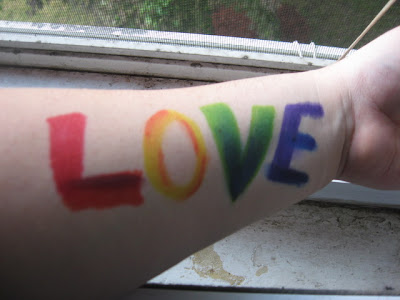With the crisp chill in the air and the tips of branches turning red to contrast with the bright blue sky, I can safely say that fall is well and truly here! Having lived most of my life in Florida, this autumn in New England will be my first "real" fall. And yet, even without a single red or orange leaf back home, autumn was always my favorite season.
Partly this has to do with the cooler weather, as I absolutely loathed summers in Florida. But partly it's because I find there's a natural rhythm, at least in this hemisphere and culture, to the last few months of the year. While I love feeling free and spontaneous in the summer, once I can see Halloween on the horizon, my thoughts turn to traditions and familiar routines. I get this powerful itch to spruce up the house in preparation to nest through the winter (even if winter will, in actuality, be just as busy as summer - my caveman brain doesn't seem to recognize that). Summer, to me, is a time for progress, moving forward, and embracing the new. But as the year dies away, I start looking toward the past and connecting with my roots a bit more. I feel more of a need to spend time in nature, to pace my life differently, to nurture myself and those closest to me rather than paying so much attention to the outside world.
Some of my favorite rituals and traditions as the year ends (which I hasten to add - I don't do everything every year!):
- Going to pumpkin patches, corn mazes or apple orchards and enjoying the beauty of the harvest
- State and county fairs, with all the lights, rides, terrible-but-delicious food, crafts, and so on
- National Coming Out Day (Oct 11), LGBT history month (October) and the Transgender Day of Remembrance (Nov 20). Not "fun" holidays, exactly, particularly that last one, but important ones which make me feel connected to my queer brothers/sisters/siblings-of-nonbinary-gender.
- Thrill the World, which I am not doing this year, but I had a BLAST at last year
- Halloween and Samhain and all the fun stuff that comes along with that
- ARGH, which I've only been to once and won't be back this year, but the fall gathering is so deliciously autumnal
- NaNoWriMo, which I don't do every year (this year I am!), but I always plan on it, and so the forums are a big sign of fall to me
- The return of Matt to regular, heavily-seasonal blogging, the Halloween and Christmas jukeboxes, and the annual Lego/Playmobil Advent calendar
- Thanksgiving, with the food and the Macy's parade and the sense of "the holidays are on the way but people haven't started freaking out and gotten all bitter yet", is my favorite holiday
- Doing a little something for Chanukah - I'm not Jewish, but Judaism has had a big influence on my beliefs, so while I'm celebrating a Christian holiday despite not being really Christian, I like to give a nod to Chanukah as well.
- The winter solstice/Yule, which highlights the original "reason for the season" - celebrating light, warmth and companionship in the dead of winter
- Christmas. Basically everything about Christmas, I do it all.
Why am I telling you all this? Well, besides the fact that I just feel like chattering excitedly, I also want to tackle a common misconception about unschooling. Many people think choosing unschooling for their family means throwing away any sense of routine, ritual, or tradition and just going wherever the wind may carry you. Some people find this idea very freeing, but for others, it's a turn-off. A lot of people feel anxious and disconnected when they don't have any predictability in life to anchor them, and a lot of these people may take one look at the apparently free-floating, hippie kind of life that unschoolers live, and go "Nuh-uh, no way, not for me!"
But unschooling doesn't have to mean throwing away all routines! What it *does* mean is that you don't force routines and traditions on your kids. It means you don't clap your hands at 10pm and announce that it's bedtime now, no matter what your kid is doing or how awake they are. It means you look at the things you do out of habit and examine whether they're actually meaningful and purposeful in your life.
But it doesn't mean you cannot ever plan anything. Not having bedtimes doesn't mean you can't have a special bath-story-snuggle routine in the evening, if your kids enjoy that. Not controlling screen time doesn't mean you can't all pile on the couch to watch The Big Bang Theory every Thursday, or House on Monday, or whatever your family enjoys. Not forcing your kids to eat breakfast doesn't mean you can't have a ritual cup of tea each morning (even if you have to sip it from a thermos while following a toddler around). If you have a routine-loving kid who needs to do X in the morning and Y in the afternoon and Z in the evening, by all means help make that happen! If your kid *wants* to do a math workbook page every day, give them a math workbook page every day! *Until* they don't want to anymore - then you let it go without a fuss. The difference between unschooling and other kinds of parenting is that nothing is forced, required, shamed or punished. That's it. So long as you're respecting and facilitating your kids' wants and needs, your family can structure life in any way that works for you, and it is Still Unschooling.
Unschooling doesn't mean the leaves don't change in the fall or the flowers don't bloom in the spring. It doesn't mean the sun doesn't rise in the east and set in the west, it doesn't make the Earth turn faster or slower (though on some of those late nights, you may not be sure). Unschooling doesn't mean you can't be the mom who knits her kids an ugly Weasley sweater* every Christmas - it only means you can't be the mom who gives your kid an ugly sweater *instead* of the Legos they wanted, and you can't force them to wear it. But if knitting the damn sweater (or other tradition your kids don't care about) makes you happy, do it! Just recognize who you're really doing it for, and allow your kids to opt out if they choose.
And if a tradition or ritual is making your family happy? Then keep it up, even if it feels silly. My mom and I kept dyeing Easter eggs until I was well into my 20s, because it was fun playing with the colors. I still make peanut butter and banana sandwiches on Elvis's birthday even though I'm not that big of a fan, just because we always did it when I was a kid. The actual meaning behind these activities is long gone, but they're still worth doing because they're still fun. When an activity is not meaningful *or* fun, that's when you throw it away and find something that suits your family better right now.
And finally, allow new rituals to pop up anytime. There was a period of time in 2009 where I got up at 5:00 every morning to watch Star Trek TNG (on DVD, so there was no concrete reason to be up this early) and eat breakfast, then went back to sleep. My mom was usually up during that time and would blearily watch along with me, then go back to sleep too. This went on for a few weeks and then stopped. This all sounds incredibly pointless from the outside, I know. But it was an important routine while it lasted, because it was predictable, comforting, and involved sharing an interest with my mom.
Make grilled cheese on Tuesdays, but be willing to cook spaghetti if your kids request it. Bake an apple pie on the first of every month. Wear pink socks every time you go to the doctor, if that amuses you. Why the hell not? Having fun and having routines don't have to be opposite goals. Saying no to fun because you haven't made room in your schedule - that's the thing you need to watch out for.
*Or ugly Wesley sweater? Nerd media is rife with ugly sweaters for you to choose from.



















